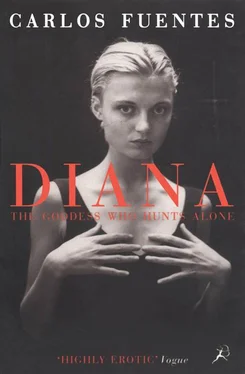Carlos Fuentes - Diana the Goddess Who Hunts Alone
Здесь есть возможность читать онлайн «Carlos Fuentes - Diana the Goddess Who Hunts Alone» весь текст электронной книги совершенно бесплатно (целиком полную версию без сокращений). В некоторых случаях можно слушать аудио, скачать через торрент в формате fb2 и присутствует краткое содержание. Год выпуска: 2012, Издательство: Bloomsbury UK, Жанр: Современная проза, на английском языке. Описание произведения, (предисловие) а так же отзывы посетителей доступны на портале библиотеки ЛибКат.
- Название:Diana the Goddess Who Hunts Alone
- Автор:
- Издательство:Bloomsbury UK
- Жанр:
- Год:2012
- ISBN:нет данных
- Рейтинг книги:3 / 5. Голосов: 1
-
Избранное:Добавить в избранное
- Отзывы:
-
Ваша оценка:
- 60
- 1
- 2
- 3
- 4
- 5
Diana the Goddess Who Hunts Alone: краткое содержание, описание и аннотация
Предлагаем к чтению аннотацию, описание, краткое содержание или предисловие (зависит от того, что написал сам автор книги «Diana the Goddess Who Hunts Alone»). Если вы не нашли необходимую информацию о книге — напишите в комментариях, мы постараемся отыскать её.
Diana the Goddess Who Hunts Alone — читать онлайн бесплатно полную книгу (весь текст) целиком
Ниже представлен текст книги, разбитый по страницам. Система сохранения места последней прочитанной страницы, позволяет с удобством читать онлайн бесплатно книгу «Diana the Goddess Who Hunts Alone», без необходимости каждый раз заново искать на чём Вы остановились. Поставьте закладку, и сможете в любой момент перейти на страницу, на которой закончили чтение.
Интервал:
Закладка:
Gently I asked her to explain. I think she sensed how I felt, because she added something I liked. She said I shouldn’t misunderstand her, that in Jeffersontown she felt suffocated not only by its smallness but by the immensity of the nature surrounding it. It was a world she couldn’t grasp.
And in the world you did choose, I asked her, do you feel protected? Will you ever know who you are, Diana? You have to be protected by other people, by the sect, by the beautiful people, the jet set, the Black Panthers, the revolutionaries — anyone, as long as there’s noise, weeping, joy, commotion, belonging. That’s what you want, that’s what I don’t give you, because I’m stuck in a corner writing for hours at a time?
I was making a fool of myself. I’d lost control. I was falling into everything I hated. I deserved Diana’s response.
“I know who I am.”
“No, you don’t!” I shouted. “That’s your problem. I heard you talking with that black man on the telephone. You want to be someone else, you want to absorb the suffering of others so you can be another person. You think no one suffers more than a black person. When are you going to learn, you fool, that suffering is universal, even white?”
“Carlos is teaching me all about it.”
“Carlos?” I said it like an echo not only of my own voice but of my own soul, incapable of telling Diana that I’d just seen him, injured, in a demonstration in Santiago.
“It’s in your books,” Diana said coldly.
“Did he tell you that?”
“No, I read them. I thought you were a real revolutionary. Someone who puts his actions where he puts his words. It’s not true. You write, but you do nothing. You’re like an American liberal.”
“You’re crazy. You don’t understand anything. Creation is an action, the only action. You don’t have to die in order to imagine death. You don’t have to be imprisoned in order to describe what a prison’s like. And if you get shot or murdered, you’re useless. You don’t write any more books.”
“Che went out to be killed.”
“He was a martyr, a hero. A writer is something much more modest, Diana.” I kept on talking to her, exasperated but now, possibly, in control of my arguments.
“Carlos would climb a mountain to fight. You wouldn’t.”
“So what’s that got to do with you? You’re going to follow him? Going to be the warrior’s woman?”
“No. His base is here. He fights here. He’d never follow me.”
“That makes things work out fine for you, right? Knowing that poor kid won’t follow you. Unless he gives up the guerrilla business and becomes a gigolo. Poor Diana. You want to be someone else? Do you want to be the midwife of universal revolution? Do you want the role of Joan of Arc married to Malcolm X? Let me tell you something. Try to be a good actress. That’s your problem, sweetheart. You’re a mediocre, bland actress, and you want to compensate for your mediocrity with all the furies of your real-life person. Why don’t you really work at the roles you get in movies? Why do you reject them and take on characters you’ve only heard talked about?”
“You don’t understand a thing. I’ve already had you.”
“One month three weeks and four days.”
“No, I know you through and through. I know who you are. I should have known from the first instant, but I let myself be dragged along by the fantasy that you were different — action and thought, like Malraux …”
“For God’s sake, spare me these revolting comparisons …”
“Naïve. All you can offer me is decency. Naïve. Decent. And cultured!”
“All defects of the worst kind …”
“No, I admire your culture. Really. A solid base, no doubt about it. Very solid. Classic, man, classic.”
“Thank you.”
“On the other hand, the boy …” She spoke with a ferocity I’d never seen in her, a hallucinatory savagery, as if finally she was showing me the dark side of the moon. “Everything about him is wrong. He smells bad, he’s got rotten teeth, he needs to see a dentist, his manners are awful, he’s got no refinement at all, he’s rough, I’m afraid he’s going to beat me up — and because of all that I like him, because of all that I find him irresistible. Now I need a man I don’t like, a man who’ll bring me back to the gutter, the sewer, who’ll make me feel I’m nobody, who’ll make me fight again, work my way up, feel I don’t have anything, that I have to earn everything, who’ll make my adrenaline flow …”
I ran to embrace her. I couldn’t hold back anymore. She was crying and she clung tightly to me, but she didn’t stop talking between sobs. “You’re crazy. I’m not looking for a black or a guerrilla, I’m looking for someone who’s not like you. I hate people like you, decent and cultured. I don’t want a famous author, decent, refined, Western no matter how Mexican he thinks he is, European like my husband. You’re my husband all over again, a repetition of Ivan Gravet, the same thing all over again. It bores me, it bores me, it bores me. At least my husband fought in a war, ran away from Russia, persecuted for being a Jew, for being a boy, for being poor. You, what have you ever run away from? What’s ever threatened you? Your table’s always been set, and you’ve always been chasing after me, trying to catch me, to catch my imagination … You’re my husband all over again, except that Ivan Gravet is more famous, more European, more cultured, more refined, and a better writer than you!”
She stopped for air, swallowing her tears. “I can’t stand men like you.”
She twisted out of my arms. She turned her back to me and walked to the liquor cabinet. I followed. She mixed a drink with trembling hands. She spoke to me with her back turned.
“I’m sorry. I didn’t want to hurt you.”
“Have a drink, it’ll make you feel better. Don’t worry,” I said, putting my hand on her shoulder. A mistake.
“No. Don’t touch me.”
“I’m going to miss you. I’m going to cry over you.”
“I won’t cry over you.” She gave me a final look, the synthesis of all her looks — happy eyes, tired eyes, bedazzled eyes, lonely eyes, fugitive eyes, orphan eyes, remembering eyes, altruistic eyes, convent eyes, whorehouse eyes, fortunate eyes, unfortunate eyes, dead eyes.
She blinked several times in a strange, dreamlike, almost insane way, and said this: “Don’t cry over me. Ten years from now your gamine will be an old lady over forty. What are you going to do with a lark with a fat ass and short legs? Thank God you’re getting out in time. Count your blessings and cut your losses. Good-bye. Désolé.”
“Désolé.”
Azucena helped me pack my things. She took my clothes out of the bedroom. I asked her with a look if the student was there. We understood each other without having to speak. She shook her head. She didn’t have to help me — she did it out of pure goodwill, so I wouldn’t feel alone, cuckolded, thrown out, or, in the last instance, badly thought of by her. She also knew I didn’t need her help; I made her understand how thankful I was for it. We exchanged few words while we packed my books, papers, and pens into my two briefcases. Then I carefully covered my typewriter.
“She was a beginner, too. She likes to help people just starting out.”
I laughed. “The midwife of the revolution, that’s what I told her.”
“She’s a very unhappy person. Seriously. She feels persecuted.”
“I think she’s right. Sometimes I thought it was nothing but paranoia. I’m beginning to think she’s right. The boy’s only going to complicate her life.”
“Diana likes risks. You didn’t give her that.”
“So she told me. Tell her to watch out. I couldn’t do anything for her in Mexico City. I hope she gets a lot out of her new love.”
Читать дальшеИнтервал:
Закладка:
Похожие книги на «Diana the Goddess Who Hunts Alone»
Представляем Вашему вниманию похожие книги на «Diana the Goddess Who Hunts Alone» списком для выбора. Мы отобрали схожую по названию и смыслу литературу в надежде предоставить читателям больше вариантов отыскать новые, интересные, ещё непрочитанные произведения.
Обсуждение, отзывы о книге «Diana the Goddess Who Hunts Alone» и просто собственные мнения читателей. Оставьте ваши комментарии, напишите, что Вы думаете о произведении, его смысле или главных героях. Укажите что конкретно понравилось, а что нет, и почему Вы так считаете.












